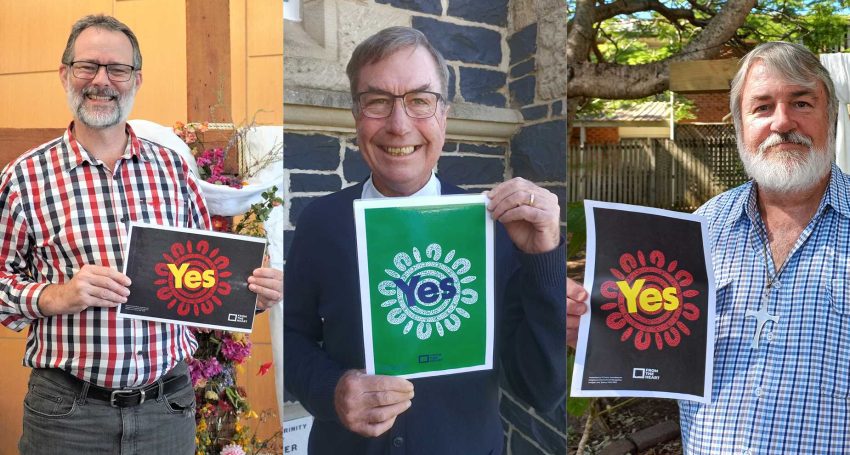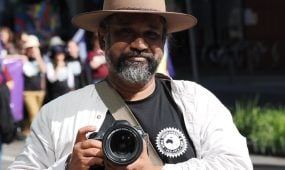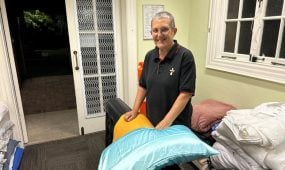“Our support of the ‘yes’ vote honours our Diocese’s long legacy”
Justice & Advocacy
“We are proud to co-author this reflection about why we are championing the Anglican Church Southern Queensland’s position in support of constitutional recognition of Aboriginal and Torres Strait Islander peoples via a Voice. The way we see it, our support of the ‘yes’ vote honours our Diocese’s long legacy, as illustrated in this timeline from the 1960s to present,” say The Ven. Geoff Hoyte, The Rev’d Rick Gummow and The Rev’d Michael Stalley

We are proud to co-author this reflection about why we are championing The Anglican Church Southern Queensland’s position in support of constitutional recognition of Aboriginal and Torres Strait Islander peoples via a Voice.
The way we see it, our support of the “yes” vote honours our Diocese’s long legacy, as illustrated in this timeline from the 1960s to present:
- 1967: Before the referendum, the Diocese of Brisbane’s Archbishop Philip Strong (while also serving as the Primate) was quoted advocating for the ‘yes’ vote in a news story in The Australian, with the headline, “Archbishop pleads for Yes vote on Aboriginals”.
- 1967: Soon after, the Archbishop of Brisbane and Primate Philip Strong joined 11 other Church leaders who “issued a statement urging Christians to vote ‘yes’ on the referendum question”.
- 1967: At the Diocese of Brisbane’s Synod, after the referendum, a motion was carried that “welcomes the affirmative vote in the recent referendum”.
- 1993: The Week of Prayer for Reconciliation was initiated, now better known as National Reconciliation Week, which is facilitated by Reconciliation Australia.
- 1997: Diocesan publication FOCUS (a precursor to anglican focus) publishes a commemorative story on the 30th anniversary of the ‘yes’ vote. The story explains that: “Archbishop Philip Strong while affirming the 1967 referendum’s ‘overwhelming ‘yes’ majority’ at the Diocese of Brisbane’s Synod in the same year, said: ‘If our hearts are fixed on a right principle in a changing world, the principle must be acted upon and continue to be in the midst of changing circumstances’.”
- 2008: The Anglican Diocese of Brisbane endorses General Synod’s 2007 Joint Affirmation of Faith and Justice with Aboriginal and Torres Strait Islander peoples, including acknowledging General Synod’s 1998 apology for the Stolen Generations.
- 2011: On behalf of the Anglican Diocese of Brisbane, the Social Responsibilities Committee made a submission in support of constitutional recognition to the Expert Panel on Constitutional Recognition of Indigenous Australians.
- 2016: The Anglican Church Southern Queensland (ACSQ) launched its first Reconciliation Action Plan, which was ratified by Diocesan Synod and later approved by Reconciliation Australia.
- 2017: After The Uluru Statement From the Heart (which includes constitutional recognition through a Voice to Parliament) was signed at a National Constitutional Convention and presented to the Australian people as an invitation, the Anglican Church Southern Queensland decided to support the Anglican Board of Mission’s 2017 call for “a Constitutionally Entrenched First Nations Voice”.
- 2017: The National Aboriginal and Torres Strait Islander Anglican Council (NATSIAC) endorses the Uluru Statement From the Heart, including the Voice (NATSIAC is the Aboriginal and Torres Strait Islander voice to General Synod – Aunty Dr Rose Elu and The Rev’d Canon Bruce Boase are NATSIAC members).
- 2018: Individual ACSQ parishes and ministries started responding to the Uluru Statement’s invitation, “to walk with us in a movement of the Australian people”, including through initiatives and events.
- 2021: The Anglican Church Southern Queensland launched its second Reconciliation Action Plan, which was ratified by Diocesan Synod and approved by Reconciliation Australia – the new RAP endorses the whole Uluru Statement From the Heart, while expressing clear support for constitutional recognition through a Voice.
- 2021: The Anglican Church Southern Queensland made a submission to the Co-design Process Senior Advisory Group Co-chairs (via the Federal Government’s website) in support of the Voice to Parliament and Government (the submission was drafted by the Reconciliation Action Plan Working Group and approved by Diocesan Council).
- 2022: The National Aboriginal and Torres Strait Islander Anglican Council (NATSIAC) reaffirmed support for the Uluru Statement From the Heart, including the Voice (NATSIAC is the Aboriginal and Torres Strait Islander ‘voice’ to General Synod – Aunty Dr Rose Elu and The Rev’d Canon Bruce Boase are NATSIAC members).
- 2022: After nearly two years of RAP Working Group enquiry, reflection and discussion, Diocesan Council approved the Anglican Church Southern Queensland formally partnering with From The Heart, the Voice to Parliament campaign stemming from the 2017 National Constitutional Convention (the ACSQ was the first Church nationally to do so).
- 2023: A number of ordained and lay Anglicans across the ACSQ join the ‘Faith Leaders for Voice Network’ of the Queensland Community Alliance.
- 2023: In line with the Diocese’s position, anglican focus begins publishing reflections by Indigenous and non-Indigenous ACSQ community members about why they are choosing to vote ‘yes’.
- 2023: On behalf of the Anglican Church Southern Queensland, senior ACSQ Aboriginal and Torres Strait Islander Elders, the Social Responsibilities Committee, Anglicare Southern Queensland and the Anglican Schools Commission made a joint submission to the Parliamentary Joint Select Committee in support of the referendum’s proposed wording.
One of the anglican focus reflections referred to above was written by Geoff Hoyte, who says that:
“I am campaigning for the ‘yes’ vote in this year’s referendum because I now have grandchildren. They won’t understand what it is all about when we vote this year, just like I didn’t understand what the 1967 referendum was about when I was five. But I want to be able to tell them about it later and that I tried to be part of making their country fairer.”
Advertisement
Michael says he is championing the ‘yes’ vote because:
“I am driven by the idea that the quality of our relationships is essential to creating a better future. A ‘Yes’ vote seems a simple, but profound, way to express a shared desire for better relationships for all. The Voice is a straightforward mechanism to ’make representations’ to Parliament and the Government about matters that impact Aboriginal and Torres Strait Islander peoples, such as about health, education and employment. A ‘Yes’ to this voice is to accept the Uluru Statement’s invitation from Aboriginal and Torres Strait Islander peoples to walk together towards a better future.”
Rick says he is backing the ‘yes’ vote because:
“I think there is an overwhelming desire, even a yearning, for Reconciliation with the First Nations of Australia. This referendum on a Voice, about the constitutional recognition of our First Peoples, has such potential to unify if we will allow it to. In my understanding, its only function will be to make representations to Parliament and the Government about matters that will impact Aboriginal and Torres Strait Islander peoples. I think this is a time to grasp the opportunity given to us; a time of great hope.”
Advertisement
Editor’s note: Would you like to ask a question about constitutional recognition through a Voice to Parliament and to the Executive Government, or about why the Anglican Church Southern Queensland has endorsed the Uluru Statement (which includes the Voice), or about The Uluru Statement From the Heart, or a related question? If so, please email RAP Working Group member Michelle McDonald via focus@anglicanchurchsq.org.au or submit an anonymous question via this link and we will do what we can at anglican focus to answer it.





